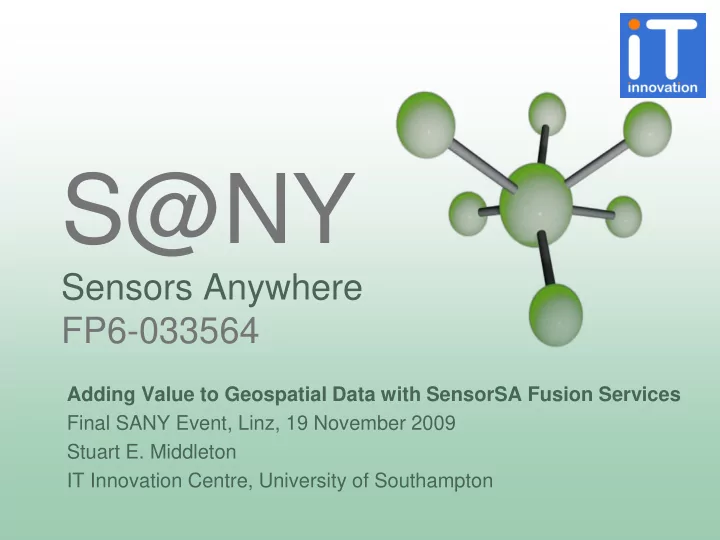

S@NY Sensors Anywhere FP6-033564 Adding Value to Geospatial Data with SensorSA Fusion Services Final SANY Event, Linz, 19 November 2009 Stuart E. Middleton IT Innovation Centre, University of Southampton
What is the value of data fusion? Question What is data fusion? How does it add value to datasets? 5
Outline of presentation Data fusion [3] – What is data fusion? – Value proposition for data fusion – What is generic data fusion? OGC standards and SANY fusion services [1] – How can the OGC standards help us? Fusion services [2] – How does a fusion service work? – Visualization Summary 6
Data fusion (1/3) What is data fusion? – Fusion of multiple data sources • Integration of data sources • Inference of new data from existing sources • Input from models as well as raw data – Data driven processing • Prediction of new values • Interpolation of missing values • Modelling of data – Example – bathing water quality assessment Impact assessment Beach attendance / day >> close beach? << Microbial contamination / day 7
Data fusion (2/3) Value proposition – Fusion techniques add value to existing data – Knowledge squared value proposition • The whole is larger than the sum of the parts Examples of adding value in SANY – Spatial fusion • Data : ground displacement measurements [Dresden] • Value: interpolation over whole areas – Temporal fusion • Data: historical water salinity measurements [Falmouth] • Value: prediction of future salinity values – Data modelling • Data: air pollution measurements [Linz] • Value: state space model of stochastic trends and daily cycles of NO 2 8
Data fusion (3/3) What about generic data fusion? – We are developing generic fusion techniques within SANY – Separating the configuration and data from the algorithm itself – Automating fusion pre-processing using O&M metadata – Why? • Lowers the cost of developing fusion algorithms • Same algorithm can be re-used for different datasets • Plug and play lowers cost of integrating new datasets 9
OGC standards and SANY fusion services (1/1) How can the OGC standards help us? – Open Geospatial Consortium (OGC) • http://www.opengeospatial.org/ – Processing protocols • Web Processing Standard (WPS) • Sensor Planning Service (SPS) – Data syntax • Observation & Measurement (O&M) – Why? • Standard interfaces lowers the cost of integrating third party software 10
Fusion services (1/2) How does a fusion service work? – Pre-processing • data aggregation, syntax checking etc – Fusion processing at different levels – Post-processing • Result formatting, storage on external servers etc Level of Fusion Pre-processing, post-processing Patterns, trends, seasonality Relationships, cause and effect Prediction, uncertainty, environment model 11
Fusion services (2/2) Wind speed and direction Visualization – Google Earth, Google Maps – Excel, Matlab – SANY SSE web portal & mapping diagram service (ETHZ) Profiles make fusion setup easier Choose property : NO 2 , O 3 , Cloud Cover, Wind, Air Temperature etc Setup algorithm params : Lag, Sill, Nugget etc (or use defaults) Run the fusion service Sensor locations SANY : Spatial, Temporal, Spatial-temporal, Causal correlation Ground movement 12
Summary Data fusion – Adds value to your data • Aggregation, interpolation, prediction – Generic fusion lowers costs • Algorithm reuse • Dataset plug and play OGC standards and SANY fusion services – Standards reduce cost of integration of third party software Fusion services – SANY provides support for different levels of fusion – Visualization of results using third party tools 13
Thanks for your attention More information and downloads on SANY-IP.EU web site! IT Innovation Centre University of Southampton Dr Stuart E. Middleton sem@it-innovation.soton.ac.uk www.it-innovation.soton.ac.uk 14
Recommend
More recommend